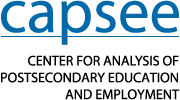North Carolina
Using North Carolina data, this study analyzed the employment and earnings outcomes for different community college pathways and awards. The outcomes for this project included employment (e.g., industry and occupation), patterns of employment and unemployment, and earnings. For pathways, specific attention was paid to: (1) remedial education, (2) vocational/technical programs, and (3) patterns and timing of student progression through programs of study. For awards, specific attention was paid to: (1) sub-baccalaureate credentials, (2) noncredit programs, (3) adult basic education programs, and (4) bachelor’s degrees. Variation in the benefits of college were examined by student characteristics, including age, gender, prior education, work experience, and specific community college. Data for this work came from the North Carolina Community College System, specifically the Curriculum Registration, Progress, Financial Aid (CRPFA) Report on each student (from 2001–02 to 2011–12), college placement test data, and high school transcript data linked to Unemployment Insurance (UI) data.
Project Leads
Clive Belfield, Queens College, City University of New York (CUNY)
Arne Kalleberg, University of North Carolina
Research Findings
What About the Non-Completers? The Labor Market Returns to Progress in Community College
Working Paper | Journal Article
Does Developmental Education Improve Labor Market Outcomes? Evidence From Two States
Working Paper | Journal Article
What About Certificates? Evidence on the Labor Market Returns to Non-Degree Community College Awards in Two States
Working Paper | Journal Article
Institutional Determinants of Labor Market Outcomes for Community College Students in North Carolina
Working Paper | Journal Article
The Medium-Term Labor Market Returns to Community College Awards: Evidence From North Carolina
Working Paper | Brief | Journal Article
